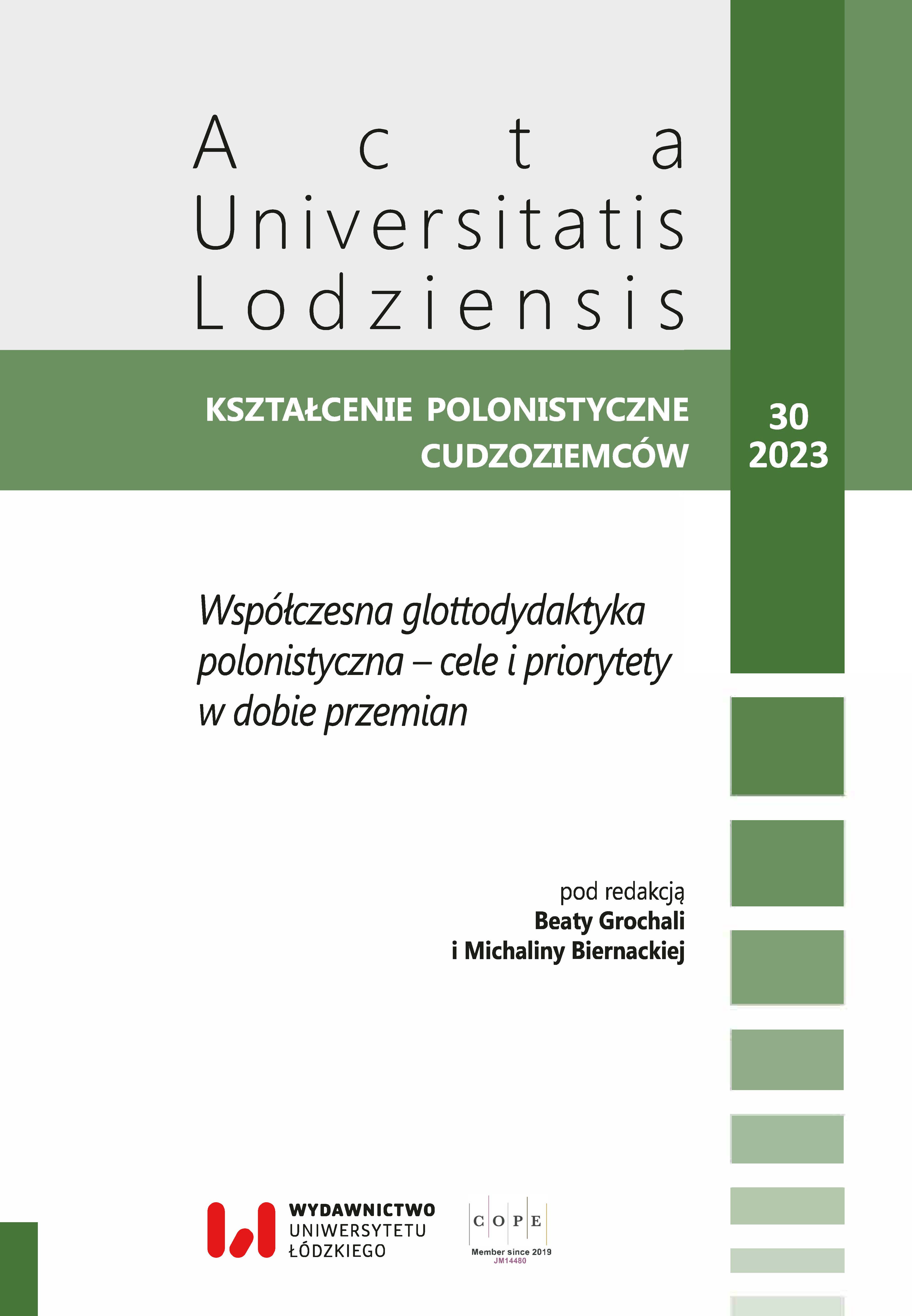The linguistic image of freedom in the statements of Polish and Ukrainian students
DOI:
https://doi.org/10.18778/0860-6587.30.24Keywords:
freedom, language of values, linguistic image of the world, cognitive definition, survey researchAbstract
The aim of the article is to show the linguistic image of freedom in the utterances of Polish and Ukrainian students studying at the Faculty of Philology of the University of Lodz and to analyze the changes in the way of defining the term by comparing our own research with those conducted in the 1990s and 2000s by another researcher, Irina Lappo (2006). Surveys were used as research material, in which students had to choose the 5 most important values from a list of 36 and number them on a scale of 1 to 5 (number 1 means the most important value, etc.), write their own definition of value, justify why the indicated value is important and provide synonyms for the selected value. The quantitative study showed what values are important to young people and how important freedom is for them. Next, the focus was on the conceptualization of the aforementioned concept, taking into account contextual factors. Since the definitions formulated by the students have the character of natural texts, the method of cognitive definition was adopted in the description of the material. Freedom turned out to be an extremely important value for young people, as shown by quantitative research: among Polish students it was in second place (12.41%), and among Ukrainian students – sixth (5.19%). In the utterances of Ukrainian students, there are visible references to the war; both in definitions, semantic connotations, as well as in the motivations for choosing values, which clearly shows that the formation of the meaning of the concept often depends on historical conditions. As for the statistical data on the frequency of semantic categories, for people of both nationalities, the most important thing is to understand freedom as the lack of restrictions. Poles are the least likely to identify the analyzed value with self-expression (10%). Ukrainians, on the other hand, did not feel free to live in harmony with themselves (0%).
References
Abramowicz M., 1993, Wolność, w: J. Bartmiński, M. Mazurkiewicz-Brzozowska (red.), Nazwy wartości. Studia leksykalno-semantyczne, Lublin, s. 147–155.
Google Scholar
Bańko M. (red.), 2000, Inny słownik języka polskiego, Warszawa.
Google Scholar
Bartmiński J., 2007, Językowe podstawy obrazu świata, Lublin.
Google Scholar
Berlin I., 1991, Dwie koncepcje wolności i inne eseje, Warszawa.
Google Scholar
Doroszewski W. (red.), Słownik języka polskiego [on-line], https://sjp.pwn.pl/doroszewski/wolnosc;5517405.html [24.03.2023].
Google Scholar
Fleischer M., 2003, Stabilność polskiej symboliki kolektywnej, w: J. Bartmiński (red.), Język w kręgu wartości, Lublin, s. 107–143.
Google Scholar
Jedliński R., 2000, Językowy obraz świata wartości w wypowiedziach uczniów kończących szkołę podstawową, Kraków.
Google Scholar
Karwatowska M., 2008, Wolność czy samowola? O „wolności” i jej granicach w wypowiedziach uczniów szkół średnich, „Studia Pragmalingwistyczne 5. Mowa i język w perspektywie dydaktycznej, logopedycznej i rozwojowej”, s. 103–116.
Google Scholar
Kominek A., 2018, Językowy obraz wolności w pismach ks. Franciszka Blachnickiego, „Poznańskie Spotkania Językoznawcze. Poznań Linguistic Forum”, nr 35–36, s. 33–43. http://doi.org/10.14746/psj.2018.3
Google Scholar
DOI: https://doi.org/10.14746/psj.2018.3
Lappo I., 2006, Wolność, w: J. Bartmiński (red.), Język. Wartości. Polityka. Zmiany rozumienia nazw wartości w okresie transformacji ustrojowej w Polsce. Raport z badań empirycznych, Lublin, s. 63–67.
Google Scholar
Majer-Baranowska U., 2004, Dwie koncepcje profilowania pojęć w lingwistyce, „Etnolingwistyka – rozprawy i analizy”, t. 16, s. 85–109.
Google Scholar
Mariański J., 1995, Młodzież między tradycją i ponowoczesnością. Wartości moralne w świadomości maturzystów, Lublin.
Google Scholar
Pelcowa H., 2014, Wolność i niepodległość w systemie wartości mieszkańców wsi, „Rozprawy Komisji Językowej ŁTN”, t. LX, s. 219–233.
Google Scholar
Pisarek W., 2002, Polskie słowa sztandarowe i ich publiczność, Kraków.
Google Scholar
Piwowarski W., 1993, ABC katolickiej nauki społecznej. Cz. 1. (Wprowadzenie, podstawy, kierunki), Pelpin.
Google Scholar
Puzynina J., 1992, Język wartości, Warszawa.
Google Scholar
Szymczak M. (red.), 1999, Słownik języka polskiego [SJPSz], Warszawa.
Google Scholar
Żmigrodzki P. (red.), Wielki słownik języka polskiego, [on-line], https://wsjp.pl/haslo/podglad/5486/wolnosc [24.03.2023].
Google Scholar
Downloads
Published
Versions
- 2023-12-07 (2)
- 2023-12-07 (1)
How to Cite
Issue
Section
License

This work is licensed under a Creative Commons Attribution-NonCommercial-NoDerivatives 4.0 International License.










